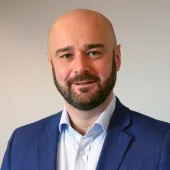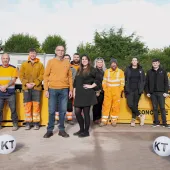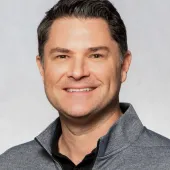Molson Finlay offer a 360° Solution

First published in the April 2019 issue of Quarry Management
Molson Group like to give the minerals extraction and recycling industries what they call a 360° solution. That means whatever customers want, Molson can supply it. The purchase of Finlay Group last year and Finlay Scotland last month are all part of this strategy, as managing director Sean Warburton explains.
Sean Warburton, managing director of Molson Finlay, is not holding back in making his mark, with the company looking forward to moving into its new, state-of-the-art premises in Stone, Staffordshire, in March 2019.
With the acquisition of Finlay Group, distributors of Terex Finlay mobile screens and crushers announced at Hillhead in June 2018, Molson Group already had him lined up to take the helm as managing director, bringing with him a wealth of knowledge and years of experience leading businesses within the crushing and screening industry, as well as plans to provide a fresh, customer-focused approach to deliver continuous growth.
In January this year Finlay Group rebranded to Molson Finlay as part of the integration of last year’s purchase and to give the wider Molson Group a coherent corporate identity (see QM, Feb 2019, p5). This rebrand has also been completed so that customers know they can expect the same high standards of service from all divisions of the group that have been established by Molson.
Along with the new branding and new offices comes a new, modern, integrated cloud-based IT structure using the e-Emphasys enterprise resource planning (ERP) software that keeps employees in the office and out in the field connected with real-time data and analytics. The data are also fed back to management for proactive, data-driven decision-making.
Mr Warburton is a qualified accountant who tends to look at the world slightly differently to most of Molson Finlay’s customers. Whole-life costs are second nature to him and he would like the industry to share that approach.
‘The key thing for any business is data – and data is changing by the day,’ he says. ‘The CRM [contact relations management] element of this new IT system gets you closer to the customer, so you can understand their needs and predict the servicing and parts requirements for the machines they operate.’
Molson Finlay also receive feedback from the telemetry sensors now included on all Terex Finlay machines. It is not data currently being shared with customers, but Mr Warburton says: ‘We want to use the information available to assist our customers to get the most from their machines.’
Telematics data are supplied free for three years when you purchase a Terex Finlay machine, after that a monthly fee is payable. Telematics is not yet widely used by the minerals extraction and recycling industries, but Mr Warburton believes if customers are not going to analyse the data for themselves, Molson Finlay will have to do it for them and, along with the company’s service contracts offering, ensure machines are kept up and running without unscheduled downtime.
For example, the Molson Finlay support team will be able to warn customers if there is excessive tramping, indicating the machine is not being loaded properly. ‘We have already started this sort of service on yellow plant,’ he says. ‘On crushers, if tramping is persistent, we might suggest solutions such as using a feeder. We are here to provide solutions and drive down costs.’
He says everything has to be about controlling costs because of the slim margins. ‘We’re on the same journey as our customers. Costs are going up and up and margins are being hit. If we can help our customers get their costs down then they will come back to us; if they grow, so do we.’
As well as using telematics to provide targeted support, Molson Finlay are also seeking to provide more equipment-specific training. One of the features of the new 500m2 premises in Stone, Staffordshire, that Mr Warburton is particularly excited about is the training centre. It will be used internally by Molson Finlay but, crucially, will also be used to help customers get the most out of their machines by using them more productively.
‘We believe we have the data and expertise to assist our customers in getting the additional production from their machines to make a real difference to their production. To help with that we have appointed a technical sales manager, Ben Sharrett. He can get these machines to really sing and dance. We are also recruiting additional engineers specifically to utilize the telematics data.
‘We can use the telematics system as the hard facts to identify quick wins in the way our customers are using their machines, as well as increasing production and avoiding downtime over the longer term.’
Molson Finlay are keen to point out that they do not hire out machines in competition with customers who have bought the machines. Rather, the machines are hired to help customers, perhaps to fill a gap while ™ they are waiting for a machine to be delivered or repaired, or to cope with a temporary increase in demand. It is because Molson did not want any confusion over hiring that it was not included in this year’s rebranding and remains Finlay Hire. ‘Finlay Hire has a very distinctive flavour,’ says Mr Warburton.
But back to telemetry. ‘What added value do we give them? I have watched the market for many years and I think there’s an area there where with the way we use this data, we can have a unique selling point. We can help customers optimize the use of their machines.’
Terex Finlay machines already have all the sensors on them for telemetry and the information those sensors gather is collected by Terex Finlay and used to improve the machines. But however good a machine is, if the customer is not making full use of its capabilities, or is not using the feedback to avoid unplanned downtime as a result of maintenance neglect, he or she is not making the best use of that machine. ‘The world has changed and we have to change with it, I would like us to lead this change in our industry,’ says Mr Warburton.
‘Terex Finlay manufacture some of the most fuel-efficient machines available on the market, with machines that use 10 litres less fuel per hour, but this benefit is quickly negated if the machine is left standing idle for long periods of the time. We can tell customers how much it’s costing them in fuel, so they can start to make changes to the way they operate and realize these benefits.
‘I worked on logistics previously, where miles per gallon rule the world. I would send people on driver training courses if their miles per gallon were too low.’
Part of the approach is using the right machine for the job and Mr Warburton says he would rather Molson Finlay did not sell a machine to a customer than sell the wrong machine to them.
‘In quarries, the operational guys tend to dictate what plant is used to deliver the products that the owners require in order to make a profit. The owners of the business tend not get involved in how the machines are used. I want to change that and believe telemetry is the way to do it, by supplying information to the owners on their smartphones and tablets.
‘I had one customer who spent £65,000 on parts in two months on two machines. They sent us an email saying they wouldn’t buy from us again. I visited them and looked at one of the machines – a shredder. They had been feeding reinforced concrete posts through it. These are high value machines!
‘I think it strange that firms think nothing of paying a mechanic £80 an hour to service their loaders and dumptrucks, but resent spending anything on crushers and screens they have spent a lot of money buying.
‘Our plant costs more than an excavator or dumptruck, but they don’t want to pay for maintenance. That’s where we can add value for our customers. There’s a real opportunity to talk to the person who owns that machine and owns the P&L about how well (or not) the machine is being used and provide training to the people operating it at our training centre in Stone.’
Molson Green, the specialist recycling machinery division of Molson Group, also have a demonstration manager, part of whose job is to make sure the machine being demonstrated is right for the customer. ‘I liked this approach when I joined the Finlay Group,’ says Mr Warburton.
‘There are machines going into the market that aren’t what the customer needs. Having a demonstration manager in pre-sales ensures people get the right machines from us and Ben’s operational expertise results in the optimum set-up of the installed kit.’
The acquisition of Finlay Group last year was an important element in Molson’s strategy to offer a 360° service – what other sectors call a one-stop shop. For Molson that means loading shovels, crushing, screening, material handling, waste processing and a full-line excavator range, but Molson did not have a premium crushing and screening brand in their portfolio.
‘We are now the largest business in Europe for both Terex Ecotec and Terex Finlay. The other key thing with the acquisition was that Molson had 30 salesmen on the road to complement Finlay’s eight salesmen. The group also has over 55 engineers to support customers, including 17 specializing in screeners and crushers. There was not much overlap between Molson’s and Finlay’s customers and we’re seeing the benefits of that already,’ says Mr Warburton.
‘Robin and Jonathan (Robin Powell and Jonathan Wilson, who founded Molson in 1996 and still own it) came up with this 360° concept and were keen to implement it across the whole business.’
The transition of Finlay Group into Molson Finlay, with the culture change that has involved, has gone smoothly, although Mr Warburton says: ‘We are, without a doubt, two differently run businesses. Molson had a more advanced sales team already working on a structure we didn’t have. Finlay Group consisted of Finlay Plant (UK) Ltd and eight or nine subsidiaries and associate companies, so it was quite a mish-mash that Molson bought. That all had to be unpicked, which has left us with three companies that, in January, were all rebranded.
‘We have merged and the best thing is the sales force. Suddenly we have another 30-plus sales people giving us nearly 40 now. That’s had a big impact. I have yet to meet the person in this industry who doesn’t buy from a person. That’s the beauty of this arrangement: if one salesman hasn’t worked, we can put another salesman in there.
‘For the operator, you can buy your digger from us, your materials handling plant, your shredder. You can buy it all from us. It gives us a lot more to talk to people about and customers prefer to deal with just one source.’
In terms of Molson’s business strategy, last month’s acquisition of Finlay Scotland (see panel) shows that Molson’s expansion is not over yet.
The acquisitions of Finlay Group and Finlay Scotland are part of a fast-paced growth plan for Molson that has been partially financed by £6.3 million from the British Growth Fund, as a result of which Bill Caplan was appointed as chair of the Molson Group last year.
The money has also facilitated organic growth such as a new depot in Inverness and a £1.5million extension to the premises in Avonmouth, due to open this spring, to expand the workshops there.
There are 15 locations, 11 of which now hold stocks of machines – because Molson Finlay had an issue with customers waiting 26 weeks for delivery of their Terex Finlay crushers, screens and, since last year, conveyors and low- and high-level feeders.
‘We wanted to hold stock, which we haven’t previously done. But we have the finance to be able to stock machines now and have just ordered 140 from Terex Finlay. Availability is key,’ says Mr Warburton.
‘The world is a little bit uncertain, but we’ve decided that, come what may, we’re going to drive the market. Having stock available will give us a competitive advantage. I think infrastructure spend will carry on no matter what. I’m still quite bullish.
‘When we leave Europe, there’s going to be some disruption, but it’s a question of trying to see the wood for the trees. I think the EU is being bullish on its side. I don’t believe it’s in anyone’s interest to come away with no deal.’
The level of growth by Molson has seen the group move into The Sunday Times Grant Thornton Top Track 250 league for the first time and it is predicted sales will hit £200 million this year, thanks to a large, premium product portfolio. ‘Molson have very quickly and silently come up and for me are now the market leaders – the largest independent market dealer,’ says Mr Warburton.
‘And there is more to come. We intend to grow organically and by acquisitions. There’s an opportunity here to offer a level of service and range of machines that customers haven’t yet experienced.’
- Subscribe to Quarry Management, the monthly journal for the mineral products industry, to read articles before they appear on Agg-Net.com








